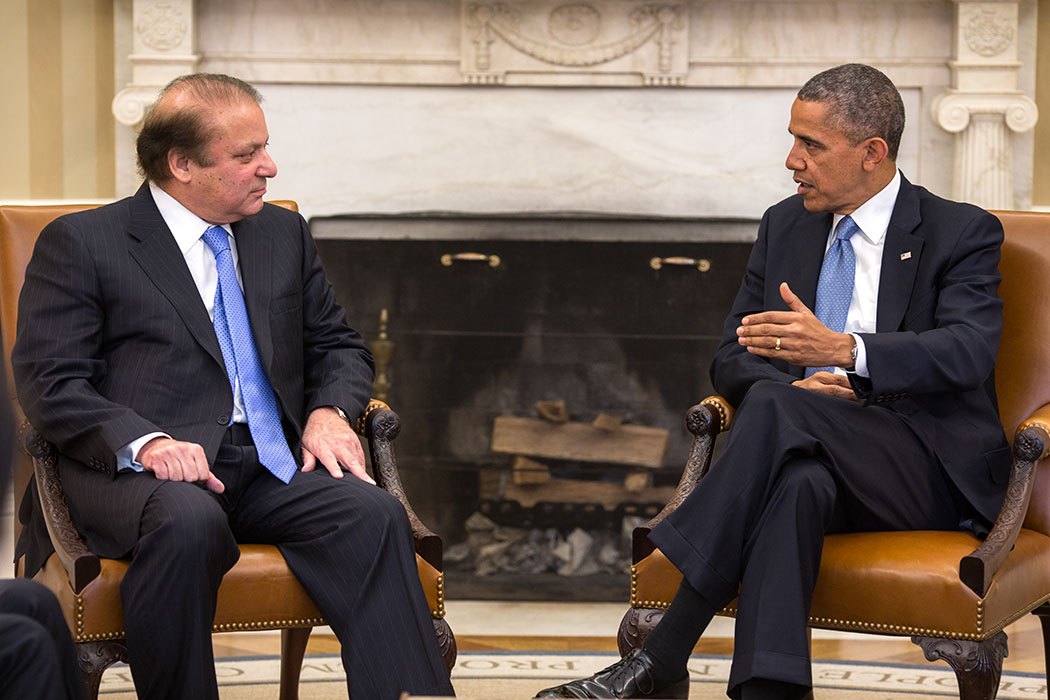Pakistan’s Identity Crisis
 Few would envy the position Pakistan’s Prime Minister, Nawaz Sharif, now finds himself in. Having continuously vacillated between the antithetical policies of diplomatic negotiations and military actions in his dealings with the Pakistani Taliban (known formally as the Tehreek-e-Taliban Pakistan or TTP), the embattled prime minister must now accept the harsh reality that his mission against the terrorist group has largely been a lone and unsuccessful one.
Few would envy the position Pakistan’s Prime Minister, Nawaz Sharif, now finds himself in. Having continuously vacillated between the antithetical policies of diplomatic negotiations and military actions in his dealings with the Pakistani Taliban (known formally as the Tehreek-e-Taliban Pakistan or TTP), the embattled prime minister must now accept the harsh reality that his mission against the terrorist group has largely been a lone and unsuccessful one.
Despite his best efforts, Sharif currently faces a resurgent Pakistani Taliban that has launched terrorist strikes at an alarming rate of efficiency, slowly but surely inching towards their stated goal of converting the country into a rigid Islamic state governed by Sharia law. Neither of the policies Sharif has wavered between has had much effectiveness at stopping this progress: his negotiations ended abruptly last month after the Taliban brutal massacred 23 paramilitary officers, and his prescribed military strikes are both extremely difficult to enact and deeply unpopular among the general populace.
Yet, despite these formidable obstacles, Sharif’s battle against the Taliban must be won—both for the sake of democracy in Pakistan, and for greater stability and peace in the region in general.
As of now, the military hawks seem to have convinced Sharif that a sustained military assault is the best way to stop the Taliban once and for all. Given the embarrassing failure of the aforementioned negotiations, this advice is perhaps not unfounded.
However, this aggressive strategy is fraught with danger: coordinated air strikes, no matter their efficiency, simply cannot eliminate the Taliban entirely, and a full ground invasion of the North Waziristan region, the Taliban’s safe haven, would be extremely risky—the Taliban knows the geography of the rugged, mountainous terrain extremely well and has won the support of the local villagers.
Furthermore, continued military action by the Pakistani forces, in any form, will likely invite retaliation from the terrorist cell in the only province that has remained relatively peaceful, the Punjab. This outcome is made all the more likely given the NATO withdrawal from Afghanistan, as the Afghani 'branch' of the Taliban, now freed from a countervailing force, will join their Pakistani neighbors in the east of the country, bolstering the Pakistani Taliban's ranks.
Considering the numerous challenges and risks posed by military engagement with the Taliban, Sharif should resist the temptation to use force against the extremist group. Unfortunately, holding back the military is a task that Sharif might not be up to. His second stint as Prime Minister in the late '90s dramatically ended in a military coup, and the Pakistani army has historically been viewed by the Pakistani people as more legitimate than the democratically-elected regimes (which have often been perceived as weak, corrupt, and inefficient). Given the power and influence the army has, Sharif might be reluctant to stand up to stop a full ground invasion of North Waziristan.
As for Sharif's other policy choice, negotiations, the outlook is far from comforting. The people of Pakistan sympathize with the Taliban’s main demands of terminating their country's relationship with the US and of imposing Sharia law on the state. Most Pakistanis would like to see their government end its dependence on the US, especially after the Americans' unpopular drone strikes in the region. Given the resurgence of Islamism since the conservative turn of the 1980's, many Pakistanis would also happily welcome a more strictly Islamic regime for their country. In comparison to Sharif's government, which is viewed by most Pakistanis as weak, secular, and subservient to the US, the Taliban will arrive at any bargaining table in a position of impressive strength.
How can Nawaz Sharif possibly redress this dire situation?
Firstly, he must articulate an alternative vision for the country by reaffirming the political-philosophical tenets proposed by Muhammad Ali Jinnah, Pakistan's founding father. That is to say, he must advocate for a Pakistani state that is both a Muslim-majority and a secular democracy; one that can enable and support a prosperous economy while maintaining peace with its neighbors (India, most notably).
Most importantly, Prime Minister Sharif must highlight and publicize the dangers inherent in the Taliban's ideology of fundamentalist Islamism. While many Pakistanis currently believe that giving in to the Taliban’s demands will end the surge of violence—thereby allowing Pakistan to overcome the impediments to its vitality—they do not realize that the Taliban also envisions a country where woman cannot work, where girls cannot go to school, and where democracy has no place. If Sharif can clearly and effectively articulate to his people the brutality entailed by a Taliban regime, he can reduce the terrorist group's popular support. Only then will he able to subdue the military and to take on the Taliban at the negotiating table.

